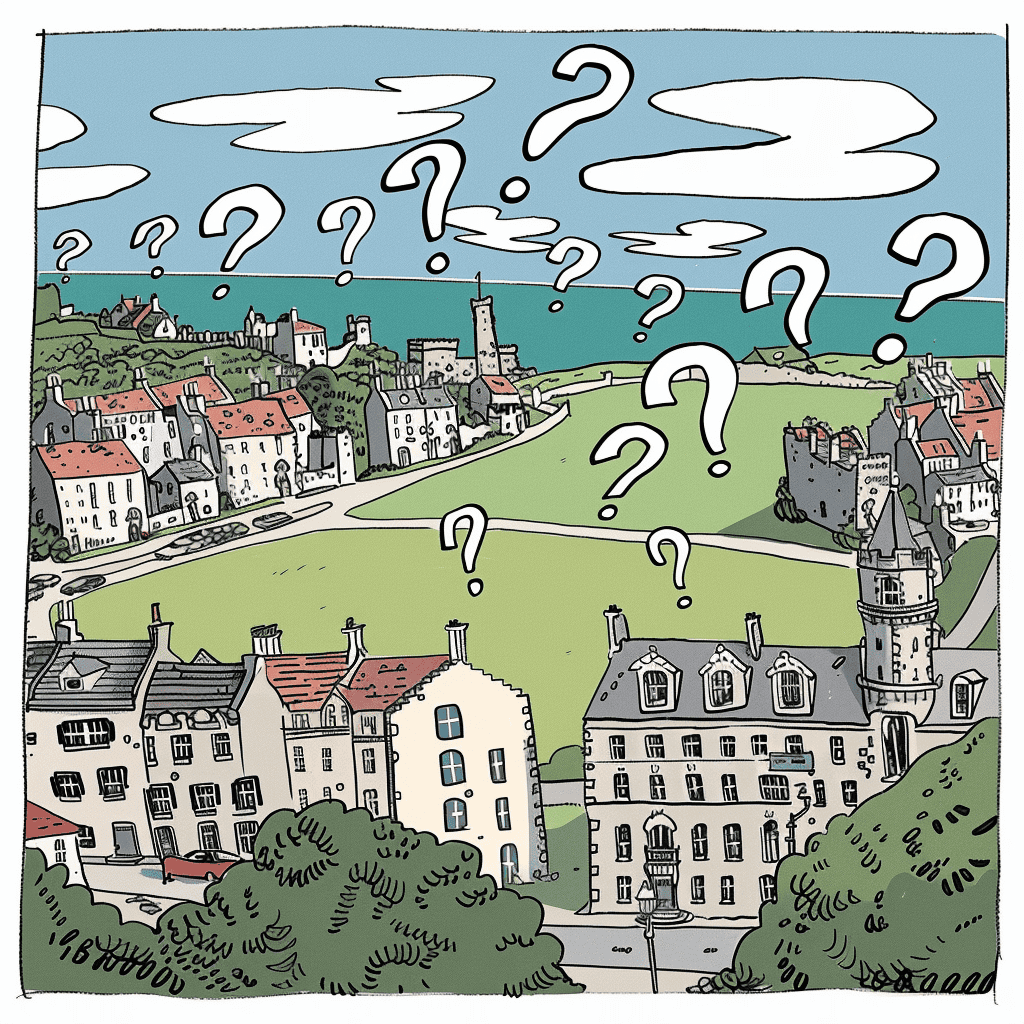St. Andrews vs. Edinburgh: Which is Better?

- Originally published
Table of Contents
We’re Breaking Down the Differences Between the University of St. Andrews and the University of Edinburgh
You’ve eliminated Oxford and Cambridge, and you’re looking for a 4-year Scottish degree. There’s just one issue: St. Andrews vs Edinburgh? The windswept north boasts two hard-hitting academic power players. Which one’s got a better reputation? Which one has the right vibes?
We sat down and talked with local and international students at both the University of Edinburgh and the University of St. Andrews. We are breaking down the biggest differences so you can get a better sense of what life will be like at Edinburgh vs. St. Andrews. There’s no substitute for attending an Open Day and sitting in on some classes, but if you can’t hop on a plane and get to Scotland, here’s is the next best thing.
I went to St. Andrews for the teaching. I think it offers a smaller classroom and more personalized experience with more support. And my field is in the arts, so I felt St. Andrews was a much better course. It’s just an academic environment where everyone knows one another and can support one another. St. Andrews just felt academically superior.
Claims to Fame At Edinburgh vs. St. Andrews
US News ranks Edinburgh #34 globally, so it’s clear students at Edinburgh leave school with a world-class education. It was here where Dolly the sheep was first cloned in 1996, and the university’s been turning out other earth-shattering innovations since Alexander Graham Bell first doodled telephones here as a student (we’re kidding about the doodles, but he was educated at Edinburgh).
I went to Edinburgh because of everything they were able to offer as far as career and graduate school. I wanted to have a work experience with my degree, and Edinburgh is a much larger city with interesting opportunities. And it’s better known internationally and is more of a research institution for graduate school admissions. I think both schools are outstanding. that was just my experience.
US News ranks the University of Edinburgh #34 globally with 29 top 100 subject areas, from arts to biology, immunology, physics, surgery, and artificial intelligence.
At the University of St. Andrews, royal students are the undergraduate talking point. Other notable points are the level of Americanism on the campus, all the way up to their Hydroflask obsession (shout out to Bend, Oregon). Heck, even Ben Franklin attended this campus that’s also known as the “51rst state”. Lest you think the University of St. Andrews is only notable for welcoming Americans, they’ve also been home to John Stuart Mill, J.M. Barrie (of Peter Pan fame), Rudyard Kipling, and Edward Jenner, who famously utilized a centuries-old technique to develop the modern smallpox vaccine.
US News ranks St. Andrews #352 in the world with no top 100 subject rankings.
Nightlife at St. Andrews vs Edinburgh
Unless you’re a shut-in, Edinburgh wins this contest hands-down. We didn’t hear from many Edinburgh students who didn’t utter the phrase “fell in love.” It’s like they teach them that during orientation week. And they may be sincere — the city of Edinburgh has won a number of accolades as one of the most “beautiful cities in the world.” It’s also a city where you’ll find craggy hilltops, the nearby Firth of Forth, and Tom Riddle’s grave.
The Edinburgh Fringe Festival draws DIY makers, giving the city a young and artistic vibe. You’ll feel it everywhere, from Ballie Ballerson’s ball-pit dance club to experimental theater nights and students biking out to the beach on weekends. Queer culture? No problem. Edinburgh is a large city, yet a student-friendly one. It’s surprisingly walkable, too.
St. Andrews is a tiny enclave where you’ll find beach bonfires and a tight-knit student community, but nothing resembling big-city nightlife.
We’ve got the most pubs per capita in the UK, but that doesn’t mean what you think it means. You won’t get a dance floor unless you go to Dundee. Busses are running back and forth to campus for students, and student halls organize trips there, but for the most part, students stay close by and go out to pubs in town, to the union, or to house parties of friends or bonfires on the beach, things like that that are privately planned.
Costs for Edinburgh vs St. Andrews University
St. Andrews edges out all other universities in Scotland for costs. But Edinburgh isn’t far behind. They’re the 2 most expensive universities in Scotland.
St. Andrews’ tuition for international students ranges from £28,190 for arts, divinity, or science to £35,920 in the school of medicine. Housing is expensive for Scotland, but reasonable and in line with London-based universities: £5,799 for a single, self-catered residence with a shared bath in Gannochy Hall, to £12,041 for a catered single in Whitehorn Hall (including catering). That same single room in Whitehorn Hall costs £6,736 without catering, which is very reasonable for UK student accommodation.
Some students at St. Andrews stay in halls all 4 years, their bills are included, and university need-based scholarships can be used only in university-managed accommodation. That’s a bonus that’s not an option at many universities, where there isn’t as much student housing available. Go off-campus and get a room in a flat with friends and you’ll pay £600 to £800 monthly (get more space in “the Badlands” on the outskirts of St. Andrews and pay less, but you’ll have a longer commute). Bills aren’t included.
St. Andrews halls are in the city, and so is the university, so you may end up walking really far for class! Look at which halls are most social so you can meet people, but also which are close to your classes.
At the University of Edinburgh, you’ll save some dough overall, though both universities’ costs are exorbitant and among the most expensive of all UK universities.
International tuition at the University of Edinburgh will cost £24,500 for social science and arts courses, £32,200 for artificial intelligence, chemistry, and the sciences, £35,000 for clinical medicine years 1 to 3 (and a whopping £49,900 in years 4 to 6), and £35,200 a year for preclinical veterinary degree study. You get the picture. Raise the prices about a third when the exchange rate is bad, and you pay more than US out-of-state tuition, plus travel, visa, phone, storage, transportation, and health care costs you may not have at home.
University of Edinburgh housing has some affordable options for your first year. It runs £2,915 to £9,950 with multiple urban locations offering single, twin, en suite, catered, etc. options. Second and third-year students will fend for themselves in the private market, and Edinburgh isn’t a bargain.
In Edinburgh, students looking for a bargain can find a room in a flat with other students for about £500 to £600. That would be a not-so-nice student house in the center city of Edinburgh. That’s comparable to the outer areas of London. Living in a flat alone, you’ll pay about £1500 per month, which won’t include bills. It’s kind of an insane process to find housing, but I haven’t known anyone who hasn’t been able to find something.
Housing Differences for Students
Since St. Andrews is a small town, you might expect private housing costs to be less expensive than in Edinburgh. However, with a small, captive audience of students, St. Andrews has artificially inflated costs and high demand for student housing.
In big-city Edinburg, there’s just more housing to go around, so demand isn’t squeezed as tight.
I heard that Edinburgh was expensive, but I share a flat with three other students, and we found it possible to find an affordable place right off the Royal Mile with a view of Edinburgh Castle. Edinburgh is still expensive, and getting more expensive all the time. There are housing crises in many Scottish cities, and students from other universities are actually competing for our student housing here, and commuting by train to places like Glasgow and Stirling. I don’t expect prices will ever get better.
In St. Andrews, students weren’t scared about missing out on housing altogether (which can be a problem at some UK universities, where housing is basically a blood sport that starts in October for the next year). There are private halls that can run up to about £1300 monthly for a private studio. There’s uni-owned housing in nearby Leuchars. There’s the private market, including larger cities like Dundee.
All in all, St. Andrews offers a little more breathing room (and cost-cutting potential) compared to Edinburgh, but you may end up lonelier as you commute from out of town every day! Dundee is 40 minutes away by bus, and that can feel like another world when other students are all centered around just a few streets in the center of St. Andrews.
I lived in a house with a lot of bedrooms in St. Andrews and because we had a large group, we got a really good deal because the price we paid was split between so many more people than normal. It turned out to be a good way to save money.
Sports and Outdoors: Edinburgh vs. St. Andrews Cities and Campus Culture
Americans will find a distinct difference in sport cultures at universities in Scotland compared to the US. That said, you can play some sports here. And you can absolutely get into some great nature in Scotland. What are the differences in your sporting life going to look like if you go to Edinburgh vs. St. Andrews?
Heading to St. Andrews? East Sands beach will offer you a beach with calm waters. You won’t surf great waves on this North Sea outpost, but you can paddleboard or sea kayak. You can find places to sail, boat, and row. Surfing club does offer some community surf sessions when conditions allow.
Some other recreational sports that are more unique Scottish experiences are affordable horseback riding (including lessons), clay pigeon shooting, rifle, rugby, polo, and scuba.
It goes without saying that you’re also in the home of golf, and should swing a club before you graduate just to get the full experience.
There are 50 sports clubs and 100 competitive teams to join.
The University of Edinburgh is bigger in sports facilities but offers less in the way of the seacoast and big nature.
With clubs, intramurals, and recreational sports, you can probably access the sport of your dreams at any level at Edinburgh, or just train and condition in two different gyms, a playing field, and outdoor sports centers. The Firbush Outdoor Sports Center, on the banks of Lake Tay, offers courses and outdoor recreation from paddlesports to mountaineering and avalanche readiness.
Back on campus, clubs offer everything from American football (don’t expect tailgating, game day traditions, or, uh, a crowd) to shinty, a cousin of field hockey and SCotland’s national sport. You can even sign up for skydiving.
Edinburgh also edges out St. Andrews as a sports-lovers school by virtue of its sports science programs, which means research, facilities, and coaching opportunities exist here that you won’t get at St. Andrews.
Neither university offers big intercollegiate competition opportunities.
Vibe Differences
Both Edinburgh and St. Andrews are ancient schools with castle vibes. But what are they actually like?
St. Andrews is for students who like traditions, formal balls, inside jokes, and donning robes. Being part of a larger legacy is very much the vibe at this school where there’s little to do that’s not connected with the university itself. Heck, the only club in town is even at the university’s student union.
It’s small and rainy, but students are wildly satisfied with their experiences here. You can’t shop or dance, and you’re cool with that because the town is pretty expensive anyway. You’ll get gorgeous, top-notch modern university facilities and foggy sea views that’ll inspire your next journal entry. Grab a famous (and cheap) grilled cheese and live your royal family dream.
I actually came here because I heard there was nothing to do. I wanted to be immersed in my studies, to stay in halls for as many years as I could, and to find my community there.
Edinburgh students have a larger, global city at their doorstep and take advantage of it. You can invent and reinvent yourself better at the University of Edinburgh.
Student satisfaction may be lower because of this larger-scale atmosphere. Students say mental health support and a general lack of academic support can combine in some programs to make them feel they’re on their own in a town that’s less known for nurturing students and more known for the regular economic comings and goings of regular residents.
While it’s not on your doorstep like St. Andrews, beach lovers will find their happy place a 30-minute bus ride away.
I will never run out of things to do in Edinburgh. There’s so much to do, and you can be very independent, get out and try new things, and meet all kinds of people.
Edinburgh can be a more welcoming place than tiny St. Andrews if you’re used to city life and looking for a more diverse student body. Most students at Edinburgh told us the city was the #1 deciding factor for them. They liked shopping, cafés, concerts, the arts scene, the beach, and the ability to find their own culture represented.
Saint Andrews or Edinburgh for Academic Programs
At the University of Edinburgh, you’ll find a mind-boggling number of academic programs. If yelling them all in order were a contest, Edinburgh would drown out St. Andrews hands down. But it’s not. The number of programs doesn’t matter much unless yours is the one missing at either school.
Where Edinburgh shines is in their combination degrees. For example, if you’re interested in their #66 ranked geosciences program, you can choose from 9 total joint degrees. Combine geophysics with anything from meteorology to geology.
St. Andrews occasionally tops some “league tables,” rankings in the UK that feel more important than in the States. However, the University of St. Andrews falters more often than Edinburgh, in part because these multifactor rankings emphasize research and publishing, and St. Andrews’ small size often means there’s more emphasis here on undergraduate teaching and learning, the humanities, and not labs and conferences.
With under 10,000 undergrads, St. Andrews ranks #352 globally according to US News, well behind Edinbburgh’s showing at #34 (#6 in the UK and #7 in Europe).
St. Andews also pulls no top 100 programs in the US News rankings. At Edinburgh, you’ll find a bevy of top-100 options, from AI to education and public health.
Ultimately, at the undergraduate level, these rankings don’t mean much for student satisfaction or quality of teaching.
The Guardian’s 2024 ranking catapults St. Andrews to the top of all UK schools, including Oxford and Cambridge.
The University of Edinburgh tends to rank higher on a global scale, while St. Andrews has greater clout at home. Edinburgh, as a larger school, gets more talk abroad and offers more in terms of research. Want to stay in the UK? St. Andrews might be ticket, with a strong reputation in the UK.
St. Andrews and Edinburgh: Undergrad Showdown
St. Andrews and Edinburgh are worth visiting on Open days, strolling the streets from Holyrood House to the castle in Edinburgh, and checking out the three streets of St. Andrews to get a sense of exactly how obscenely small that feels for you.
The students we’ve talked to like St. Andrews for its traditions, and that’s exactly why many felt turned off by the university: it has a long history, in-group knowledge, and activities that can alienate outsiders.
Both universities have a reputation for posh students — maybe it’s their high price tags — which can make students choose Edinburgh, where they’re more able to escape “the bubble” of their own courses and make friends from all walks of life.
The best place for you is often presented as the choice between a big city and a medieval town. But both universities and cities are historical, beautiful, and academic. There’s more nuance than the city/town divide.
Pros and Cons of Edinburgh and St. Andrews? It Depends on You
In the end, the vibe of both universities is really individual.
If you want a wide range of courses, people, sports activities, city activities, and cultural escapes, Edinburgh will feel more like home to you.
If you dream of hunkering down in a cable-knit sweater with a tea and a college that feels like boarding school, St. Andrews may be your vibe.
You’ll get fewer course options here, but a more personalized student experience designed around the undergraduate experience (and perhaps with more professors teaching your classes, more face time, and more support — again, that’s not a cut-and-dried truth for all students in all programs).
Overall, both are stellar schools and you can visit the other during your time in Scotland, knowing that no matter which you pick, you got a world-class education.
Related Posts

Jessica Share
Jessica is the writer, Ph.D., and mom-of-an-abroad-student-in-the-UK at the helm of College Abroad Guides. When she's not asking college students where the coolest place to hang out in their city is, she's figuring out how she can make $60 imported Greek oregano potato chips and £50 British bacon potato chips appear on her doorstep for the cost of a local bag of Lay's.





